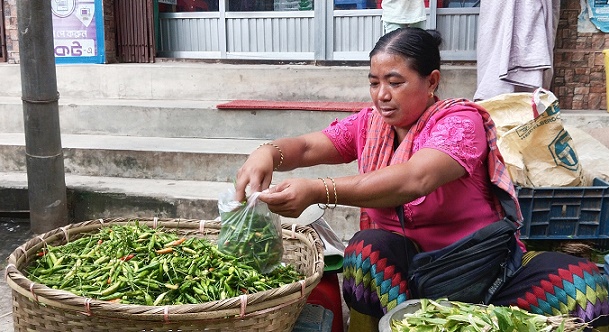The pepper grown in the hills is called by different names. Locally known as Dhani pepper, Jume pepper, Baitta pepper, Dhanya pepper, Chikan pepper. The pepper is small in size but has a lot of spiciness. Just like the solder, so is the fire. Those peppers can be found in the hilly areas of Bandarban, Rangamati and Khagrachari. In the local markets every afternoon in the haats, these chilies are found. The raw chilies produced in Jum have good quality. Green pepper contains vitamin C.
Apart from this, pepper contains vitamin A, B-1, B-2, vitamin K. The capsiaicin present in pepper reduces high blood pressure in the body, relieves headache, knee, back pain and arthritis. Hence, there is a huge demand for this Dhani pepper in the three hill districts. But in this zoom of the market, the price of pepper is increasing, the buyers are uncomfortable.
This Dhani Chili is very popular among hill people in the three hilly regions. The use of this pepper is very common in all their cooking. The pepper is small in size but has a lot of spiciness. As the pepper is hot, the taste is completely different from other chilies. Dhani chili adds a distinct flavor to curries and salads. Bharta and chutney are also made and eaten. In local hotels or food restaurants this rice is cooked more with chili. The pepper is small in size but contains more seeds. Spice is about two to three times more than other chilies. In the local markets, the price of Dhani chili is several times higher than this common chili.
Usually this Dhani pepper is planted during the sowing of jum paddy in the hills around April-May. Most Jumias sprinkle the seeds on the Jum. Again, many people dig the ground and sow seeds to be sure. Because there is a possibility of being washed away by rain water when sprinkled and less if the soil is dug up. After three to four months the yield starts coming and it is white and green when raw. Dhani chili is ready to eat soon after jum paddy is harvested in September-October. Its yield is available till November. Paddy pepper is one of the cash crops of hill Jumias.
According to the information of the District Agriculture Extension Department, 250 hectares of dhani chilies have been cultivated in Bandarban this year. The stakeholders hope to get better yield this year than last year.
Local market of Bandarban Marma Bazar, Kalaghata, Balaghata Bazar and small markets are filled with Dhani Chili collection. Most of these peppers are sold by local women. Tk 600 taka and Tk 800 sometimes demanded for per kg of dhani pepper. There is a demand for it in the people of the mountains. But the buyers are uncomfortable with the price. This Dhani pepper is produced in Chimbuk, Rowangchari, Alikadam Thanchi and Ruma where the pepper is supplied from the Jumias of the hills who grow jum. Retail buyers also go to the mountains to collect dhani pepper. Most of the people who cultivate this dhani pepper are Mro, Chakma, Bom and Marmara. The people of the hills cook with dhani pepper in various ways. Many have said that the curry does not taste better without this pepper.
Buyers said that this dhani pepper is very popular among hill people. Apart from this pepper, other peppers do not have much flavor. Although the pepper is small, there is a lot of salt. But due to the high price of dhani pepper, many buyers are unable to approach. Some people are buying 250 grams i.e. one poa because it is not tasty. New chilies are not available in the market and have to be bought at double price. However, many people said that the food does not taste spicy without this dhani pepper.
Marmas sold Dhani pepper in Marma market. They said, due to the non-arrival of new rice and pepper from Jhum price has to be increased. They have to buy for Tk one thousand per bag and if you calculate with car rental, they have to sell it for Tk 800 or sometimes it is reduced to tk 600. It has some dividends.
Shahikul Rahman, the trader of Dhani Pepper in Central Mosque Market, said the same thing. He said, you have to go around the mountains to buy pepper. Moreover, as new pepper did not come, I had to buy it at double the price. Many times this pepper is not found and rotting starts when it gets wet. However, he said that the price of pepper will come down if the new Dhani pepper supply of Zoom comes.
District Agriculture Extension Directorate Deputy Director SM Shahnewaz said that due to last year's floods, the farmers got good prices even though the yield of dhani chilies was low. This year some dhani pepper is seen from Jum, but the full supply of new pepper will be around October. But talking about the price, there may be an increase in the price until the new chilies are supplied by jhum. We are optimistic that the current year will yield better than last year, the official assured.
ZH






